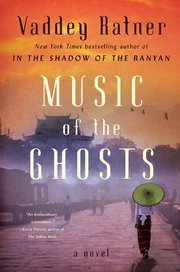A Cambodian Refugee Returns Home, to a Landscape Brutally Changed
This content was originally published by GAIUTRA BAHADUR on 26 May 2017 | 9:00 am.
Source link
Photo
Credit
Eleni Kalorkoti
MUSIC OF THE GHOSTS
By Vaddey Ratner
324 pp. Touchstone. $26.
Vaddey Ratner calls each of the three parts of her tenaciously melodic second novel a movement. And indeed this story of an orphaned Cambodian refugee’s return to her homeland does have a symphony’s elevating effect on emotion. Ratner stirs feeling — sorrow, sympathy, pleasure — through language so ethereal in the face of dislocation and loss that its beauty can only be described as stubborn.
“Music of the Ghosts” is an aesthetic gesture akin to the plaintive playing Ratner’s protagonist, Suteera, hears in the novel’s third movement while walking through a forest near Angkor’s ancient temples. In a remote clearing, she finds an unlikely ensemble, the victims of land mines: a blind man, a fisherman, an amputee, a former Khmer Rouge insurgent and a former government soldier, rivals in another life now joined in making otherworldly music. The three-stringed instrument whose lament transfixes Suteera has only one string that still works. Both the musicians and their instruments are broken, disfigured, yet still they create beguiling art.
They also provoke an unsettling memory. Once before, in that very region, Suteera had heard the quiver of a string plucked in the wild. Then she and her aunt were fleeing Cambodia through an abandoned rice field sown with corpses and mines. Everyone else in her family was dead — except for her father, whose fate she did not know. Just before a mine exploded, claiming most of their escaping party, they heard a faint cry, resembling the sound of a lute. A little later, Suteera thought she heard it again. But when she told their captor turned savior, the Khmer Rouge soldier who guided them across the Thai border, he dismissed it as hallucination. “Out here,” he proclaimed, “there’s only music of the ghosts.”
Photo

Such echoes haunt Suteera’s journey when she travels from her new home in Minneapolis to the Buddhist temple where her father had been raised by monks. Ostensibly there to scatter her aunt’s ashes, she has been lured by a letter from a guilt-stricken man who calls himself the Old Musician and claims that he met her father in one of Pol Pot’s prisons. He also claims to have three classical instruments owned by her father and intended for her. Suteera returns half-hoping to find her soldier savior as well as her father, half-thinking the musician might in fact be her father. As the novel shifts between past and present, from her perspective to that of the Old Musician, another set of instruments emerges as symbolic: electric cords with exposed wires, metal clamps, pliers, a rope, all hung on the wall of the prison. One set of instruments is the dark twin, the reverberation, of the other.
Continue reading the main story
The post A Cambodian Refugee Returns Home, to a Landscape Brutally Changed appeared first on Art of Conversation.



